Collaborative Nursing Practice: A Reflective Analysis of Interaction
VerifiedAdded on 2023/04/21
|11
|2860
|311
Essay
AI Summary
This reflective essay delves into a research nurse's experience assisting a 50-year-old woman with Rheumatoid Arthritis, employing Gibb's reflective model to analyze the treatment process and challenges encountered. It highlights the importance of a healthy therapeutic relationship, especially when interacting with older patients, and addresses issues arising from differing viewpoints, such as religious restrictions affecting treatment. The essay further explores coping strategies, including physical exercises, psychiatric counseling, and holistic care, emphasizing the significance of emotional intelligence, mentalizing, and self-awareness for nurses. Ultimately, it concludes that fostering a stable nurse-patient relationship is crucial for effective healing, requiring nurses to adapt their communication and treatment strategies based on the patient's age, cultural background, and individual needs while prioritizing empathy, active listening, and a holistic approach to care.
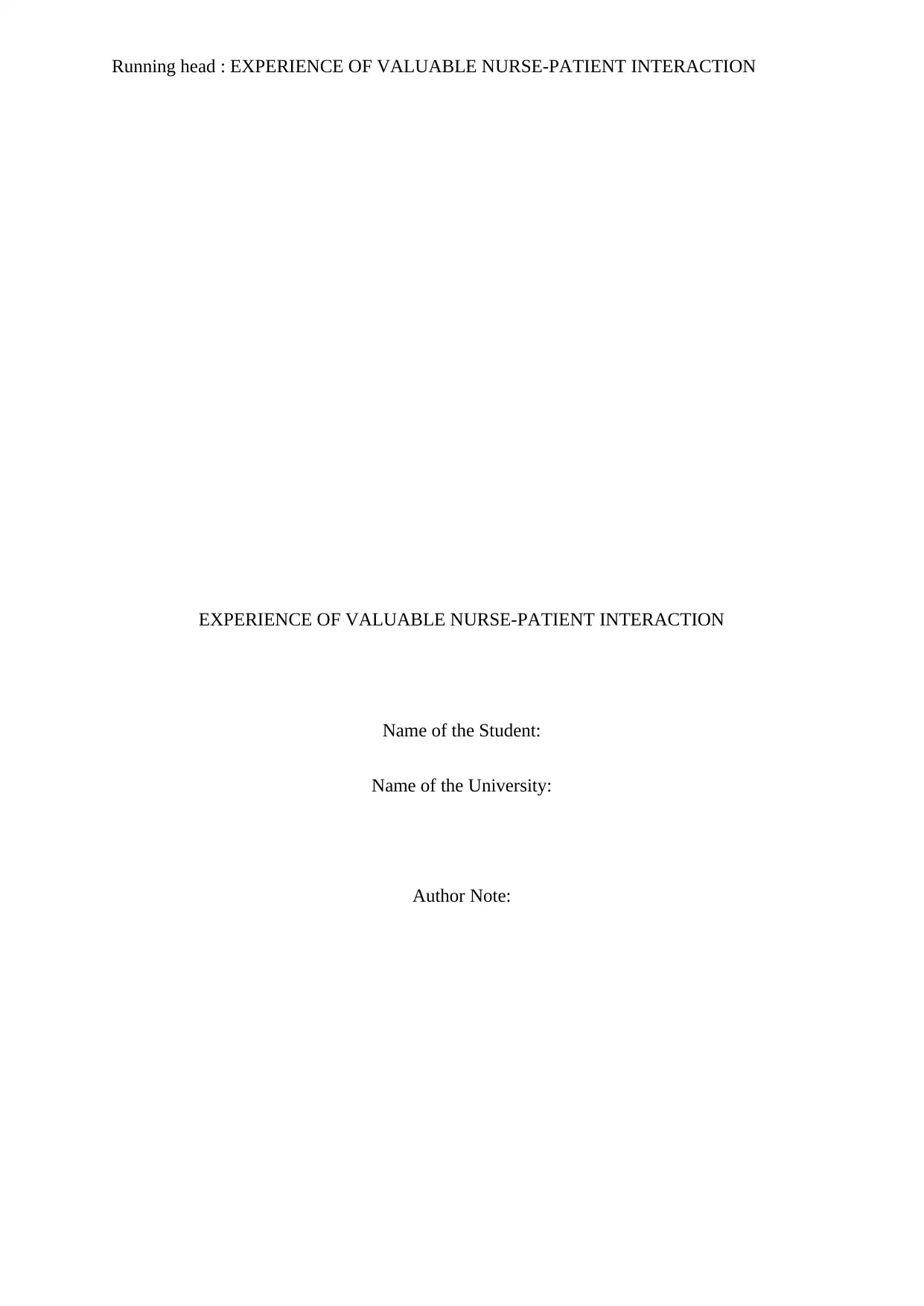
Running head : EXPERIENCE OF VALUABLE NURSE-PATIENT INTERACTION
EXPERIENCE OF VALUABLE NURSE-PATIENT INTERACTION
Name of the Student:
Name of the University:
Author Note:
EXPERIENCE OF VALUABLE NURSE-PATIENT INTERACTION
Name of the Student:
Name of the University:
Author Note:
Paraphrase This Document
Need a fresh take? Get an instant paraphrase of this document with our AI Paraphraser
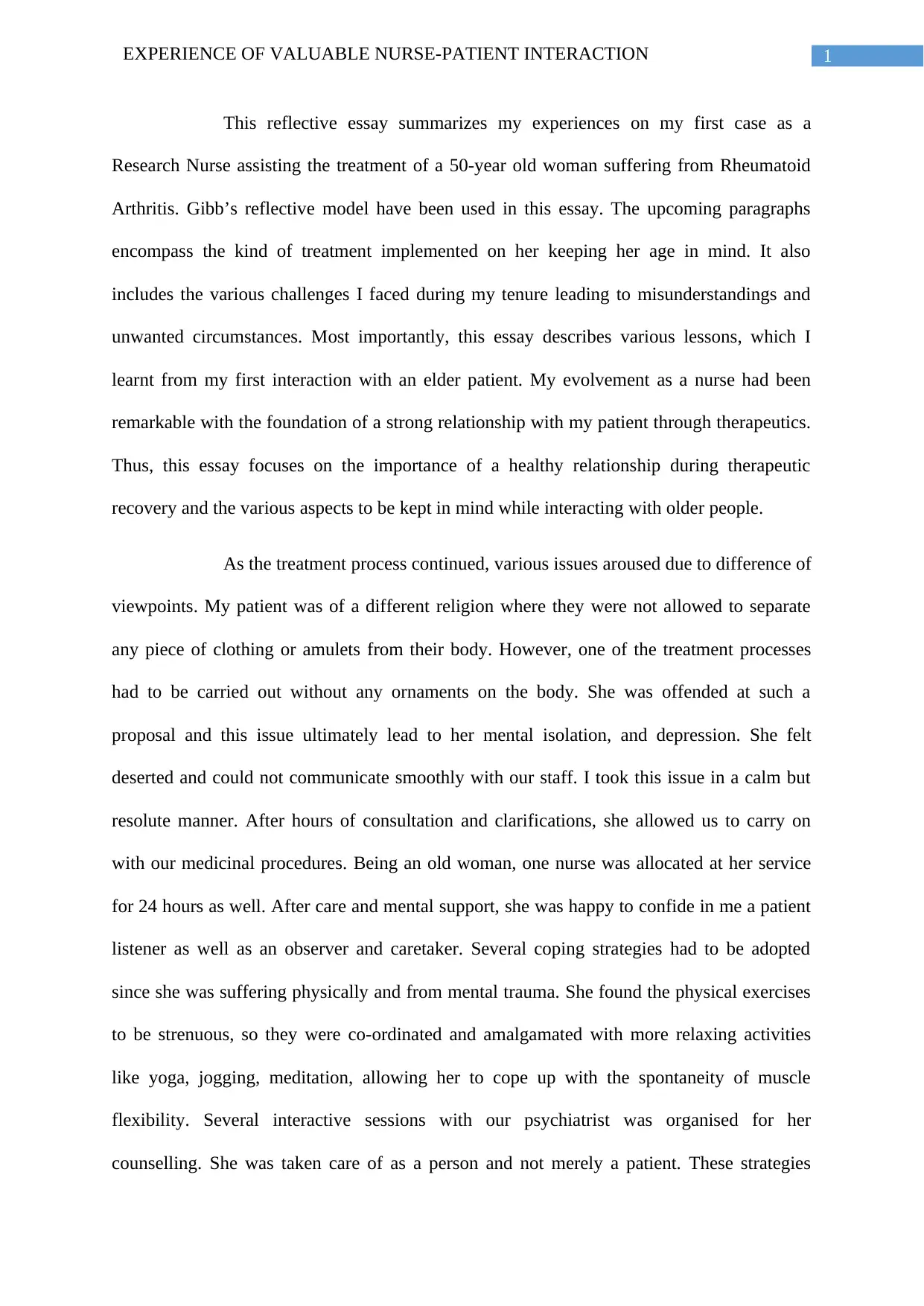
1EXPERIENCE OF VALUABLE NURSE-PATIENT INTERACTION
This reflective essay summarizes my experiences on my first case as a
Research Nurse assisting the treatment of a 50-year old woman suffering from Rheumatoid
Arthritis. Gibb’s reflective model have been used in this essay. The upcoming paragraphs
encompass the kind of treatment implemented on her keeping her age in mind. It also
includes the various challenges I faced during my tenure leading to misunderstandings and
unwanted circumstances. Most importantly, this essay describes various lessons, which I
learnt from my first interaction with an elder patient. My evolvement as a nurse had been
remarkable with the foundation of a strong relationship with my patient through therapeutics.
Thus, this essay focuses on the importance of a healthy relationship during therapeutic
recovery and the various aspects to be kept in mind while interacting with older people.
As the treatment process continued, various issues aroused due to difference of
viewpoints. My patient was of a different religion where they were not allowed to separate
any piece of clothing or amulets from their body. However, one of the treatment processes
had to be carried out without any ornaments on the body. She was offended at such a
proposal and this issue ultimately lead to her mental isolation, and depression. She felt
deserted and could not communicate smoothly with our staff. I took this issue in a calm but
resolute manner. After hours of consultation and clarifications, she allowed us to carry on
with our medicinal procedures. Being an old woman, one nurse was allocated at her service
for 24 hours as well. After care and mental support, she was happy to confide in me a patient
listener as well as an observer and caretaker. Several coping strategies had to be adopted
since she was suffering physically and from mental trauma. She found the physical exercises
to be strenuous, so they were co-ordinated and amalgamated with more relaxing activities
like yoga, jogging, meditation, allowing her to cope up with the spontaneity of muscle
flexibility. Several interactive sessions with our psychiatrist was organised for her
counselling. She was taken care of as a person and not merely a patient. These strategies
This reflective essay summarizes my experiences on my first case as a
Research Nurse assisting the treatment of a 50-year old woman suffering from Rheumatoid
Arthritis. Gibb’s reflective model have been used in this essay. The upcoming paragraphs
encompass the kind of treatment implemented on her keeping her age in mind. It also
includes the various challenges I faced during my tenure leading to misunderstandings and
unwanted circumstances. Most importantly, this essay describes various lessons, which I
learnt from my first interaction with an elder patient. My evolvement as a nurse had been
remarkable with the foundation of a strong relationship with my patient through therapeutics.
Thus, this essay focuses on the importance of a healthy relationship during therapeutic
recovery and the various aspects to be kept in mind while interacting with older people.
As the treatment process continued, various issues aroused due to difference of
viewpoints. My patient was of a different religion where they were not allowed to separate
any piece of clothing or amulets from their body. However, one of the treatment processes
had to be carried out without any ornaments on the body. She was offended at such a
proposal and this issue ultimately lead to her mental isolation, and depression. She felt
deserted and could not communicate smoothly with our staff. I took this issue in a calm but
resolute manner. After hours of consultation and clarifications, she allowed us to carry on
with our medicinal procedures. Being an old woman, one nurse was allocated at her service
for 24 hours as well. After care and mental support, she was happy to confide in me a patient
listener as well as an observer and caretaker. Several coping strategies had to be adopted
since she was suffering physically and from mental trauma. She found the physical exercises
to be strenuous, so they were co-ordinated and amalgamated with more relaxing activities
like yoga, jogging, meditation, allowing her to cope up with the spontaneity of muscle
flexibility. Several interactive sessions with our psychiatrist was organised for her
counselling. She was taken care of as a person and not merely a patient. These strategies
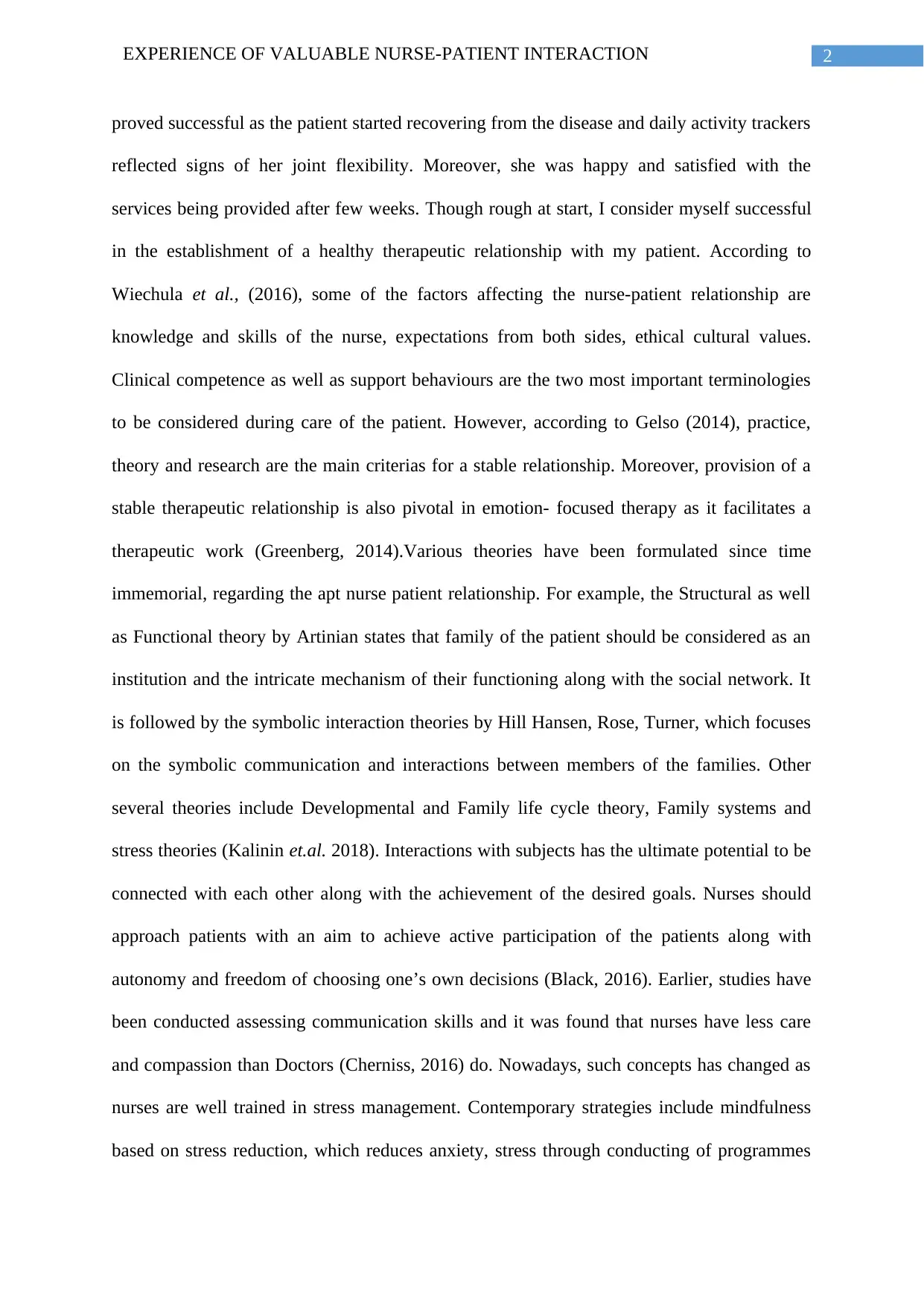
2EXPERIENCE OF VALUABLE NURSE-PATIENT INTERACTION
proved successful as the patient started recovering from the disease and daily activity trackers
reflected signs of her joint flexibility. Moreover, she was happy and satisfied with the
services being provided after few weeks. Though rough at start, I consider myself successful
in the establishment of a healthy therapeutic relationship with my patient. According to
Wiechula et al., (2016), some of the factors affecting the nurse-patient relationship are
knowledge and skills of the nurse, expectations from both sides, ethical cultural values.
Clinical competence as well as support behaviours are the two most important terminologies
to be considered during care of the patient. However, according to Gelso (2014), practice,
theory and research are the main criterias for a stable relationship. Moreover, provision of a
stable therapeutic relationship is also pivotal in emotion- focused therapy as it facilitates a
therapeutic work (Greenberg, 2014).Various theories have been formulated since time
immemorial, regarding the apt nurse patient relationship. For example, the Structural as well
as Functional theory by Artinian states that family of the patient should be considered as an
institution and the intricate mechanism of their functioning along with the social network. It
is followed by the symbolic interaction theories by Hill Hansen, Rose, Turner, which focuses
on the symbolic communication and interactions between members of the families. Other
several theories include Developmental and Family life cycle theory, Family systems and
stress theories (Kalinin et.al. 2018). Interactions with subjects has the ultimate potential to be
connected with each other along with the achievement of the desired goals. Nurses should
approach patients with an aim to achieve active participation of the patients along with
autonomy and freedom of choosing one’s own decisions (Black, 2016). Earlier, studies have
been conducted assessing communication skills and it was found that nurses have less care
and compassion than Doctors (Cherniss, 2016) do. Nowadays, such concepts has changed as
nurses are well trained in stress management. Contemporary strategies include mindfulness
based on stress reduction, which reduces anxiety, stress through conducting of programmes
proved successful as the patient started recovering from the disease and daily activity trackers
reflected signs of her joint flexibility. Moreover, she was happy and satisfied with the
services being provided after few weeks. Though rough at start, I consider myself successful
in the establishment of a healthy therapeutic relationship with my patient. According to
Wiechula et al., (2016), some of the factors affecting the nurse-patient relationship are
knowledge and skills of the nurse, expectations from both sides, ethical cultural values.
Clinical competence as well as support behaviours are the two most important terminologies
to be considered during care of the patient. However, according to Gelso (2014), practice,
theory and research are the main criterias for a stable relationship. Moreover, provision of a
stable therapeutic relationship is also pivotal in emotion- focused therapy as it facilitates a
therapeutic work (Greenberg, 2014).Various theories have been formulated since time
immemorial, regarding the apt nurse patient relationship. For example, the Structural as well
as Functional theory by Artinian states that family of the patient should be considered as an
institution and the intricate mechanism of their functioning along with the social network. It
is followed by the symbolic interaction theories by Hill Hansen, Rose, Turner, which focuses
on the symbolic communication and interactions between members of the families. Other
several theories include Developmental and Family life cycle theory, Family systems and
stress theories (Kalinin et.al. 2018). Interactions with subjects has the ultimate potential to be
connected with each other along with the achievement of the desired goals. Nurses should
approach patients with an aim to achieve active participation of the patients along with
autonomy and freedom of choosing one’s own decisions (Black, 2016). Earlier, studies have
been conducted assessing communication skills and it was found that nurses have less care
and compassion than Doctors (Cherniss, 2016) do. Nowadays, such concepts has changed as
nurses are well trained in stress management. Contemporary strategies include mindfulness
based on stress reduction, which reduces anxiety, stress through conducting of programmes
⊘ This is a preview!⊘
Do you want full access?
Subscribe today to unlock all pages.

Trusted by 1+ million students worldwide
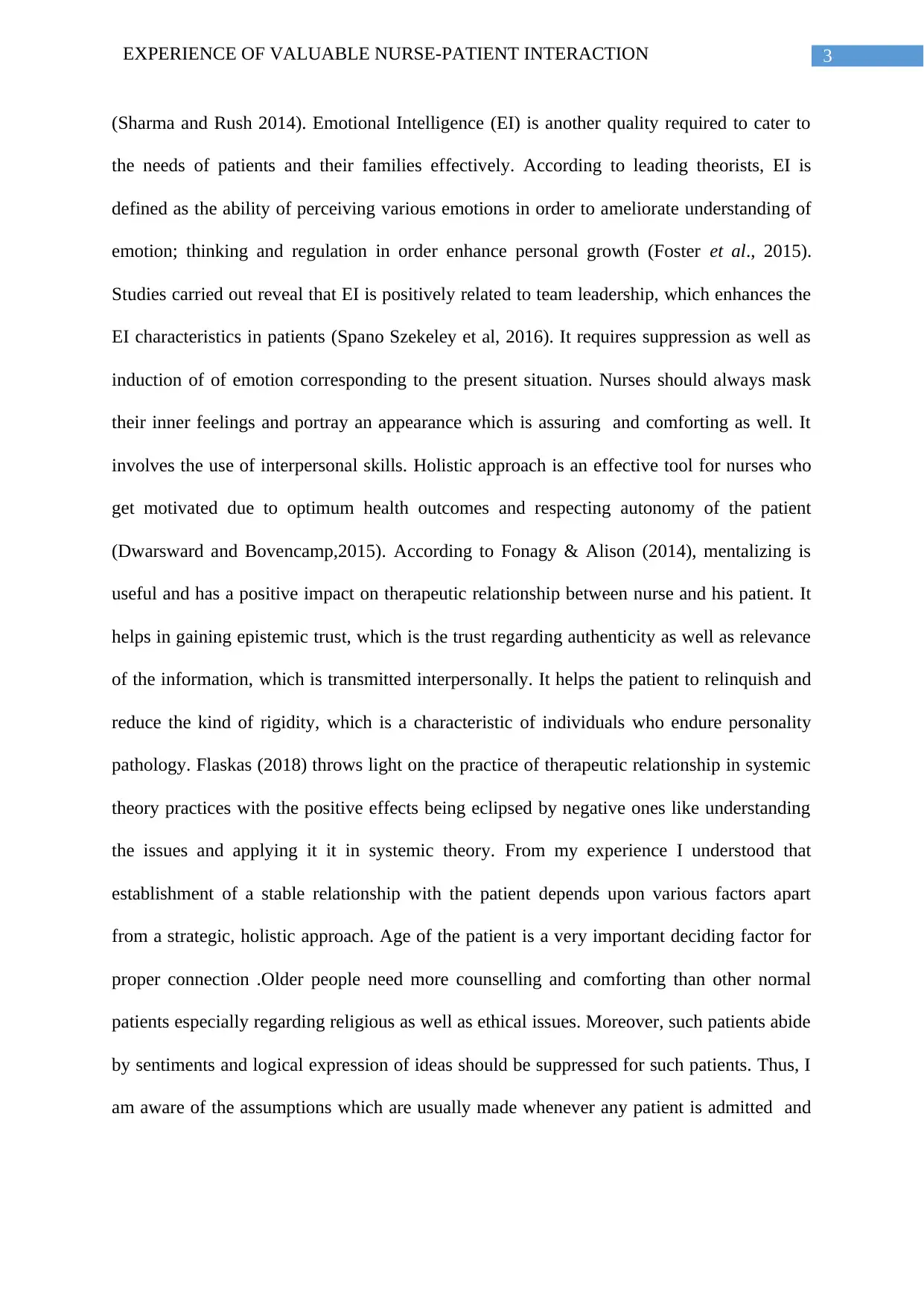
3EXPERIENCE OF VALUABLE NURSE-PATIENT INTERACTION
(Sharma and Rush 2014). Emotional Intelligence (EI) is another quality required to cater to
the needs of patients and their families effectively. According to leading theorists, EI is
defined as the ability of perceiving various emotions in order to ameliorate understanding of
emotion; thinking and regulation in order enhance personal growth (Foster et al., 2015).
Studies carried out reveal that EI is positively related to team leadership, which enhances the
EI characteristics in patients (Spano Szekeley et al, 2016). It requires suppression as well as
induction of of emotion corresponding to the present situation. Nurses should always mask
their inner feelings and portray an appearance which is assuring and comforting as well. It
involves the use of interpersonal skills. Holistic approach is an effective tool for nurses who
get motivated due to optimum health outcomes and respecting autonomy of the patient
(Dwarsward and Bovencamp,2015). According to Fonagy & Alison (2014), mentalizing is
useful and has a positive impact on therapeutic relationship between nurse and his patient. It
helps in gaining epistemic trust, which is the trust regarding authenticity as well as relevance
of the information, which is transmitted interpersonally. It helps the patient to relinquish and
reduce the kind of rigidity, which is a characteristic of individuals who endure personality
pathology. Flaskas (2018) throws light on the practice of therapeutic relationship in systemic
theory practices with the positive effects being eclipsed by negative ones like understanding
the issues and applying it it in systemic theory. From my experience I understood that
establishment of a stable relationship with the patient depends upon various factors apart
from a strategic, holistic approach. Age of the patient is a very important deciding factor for
proper connection .Older people need more counselling and comforting than other normal
patients especially regarding religious as well as ethical issues. Moreover, such patients abide
by sentiments and logical expression of ideas should be suppressed for such patients. Thus, I
am aware of the assumptions which are usually made whenever any patient is admitted and
(Sharma and Rush 2014). Emotional Intelligence (EI) is another quality required to cater to
the needs of patients and their families effectively. According to leading theorists, EI is
defined as the ability of perceiving various emotions in order to ameliorate understanding of
emotion; thinking and regulation in order enhance personal growth (Foster et al., 2015).
Studies carried out reveal that EI is positively related to team leadership, which enhances the
EI characteristics in patients (Spano Szekeley et al, 2016). It requires suppression as well as
induction of of emotion corresponding to the present situation. Nurses should always mask
their inner feelings and portray an appearance which is assuring and comforting as well. It
involves the use of interpersonal skills. Holistic approach is an effective tool for nurses who
get motivated due to optimum health outcomes and respecting autonomy of the patient
(Dwarsward and Bovencamp,2015). According to Fonagy & Alison (2014), mentalizing is
useful and has a positive impact on therapeutic relationship between nurse and his patient. It
helps in gaining epistemic trust, which is the trust regarding authenticity as well as relevance
of the information, which is transmitted interpersonally. It helps the patient to relinquish and
reduce the kind of rigidity, which is a characteristic of individuals who endure personality
pathology. Flaskas (2018) throws light on the practice of therapeutic relationship in systemic
theory practices with the positive effects being eclipsed by negative ones like understanding
the issues and applying it it in systemic theory. From my experience I understood that
establishment of a stable relationship with the patient depends upon various factors apart
from a strategic, holistic approach. Age of the patient is a very important deciding factor for
proper connection .Older people need more counselling and comforting than other normal
patients especially regarding religious as well as ethical issues. Moreover, such patients abide
by sentiments and logical expression of ideas should be suppressed for such patients. Thus, I
am aware of the assumptions which are usually made whenever any patient is admitted and
Paraphrase This Document
Need a fresh take? Get an instant paraphrase of this document with our AI Paraphraser
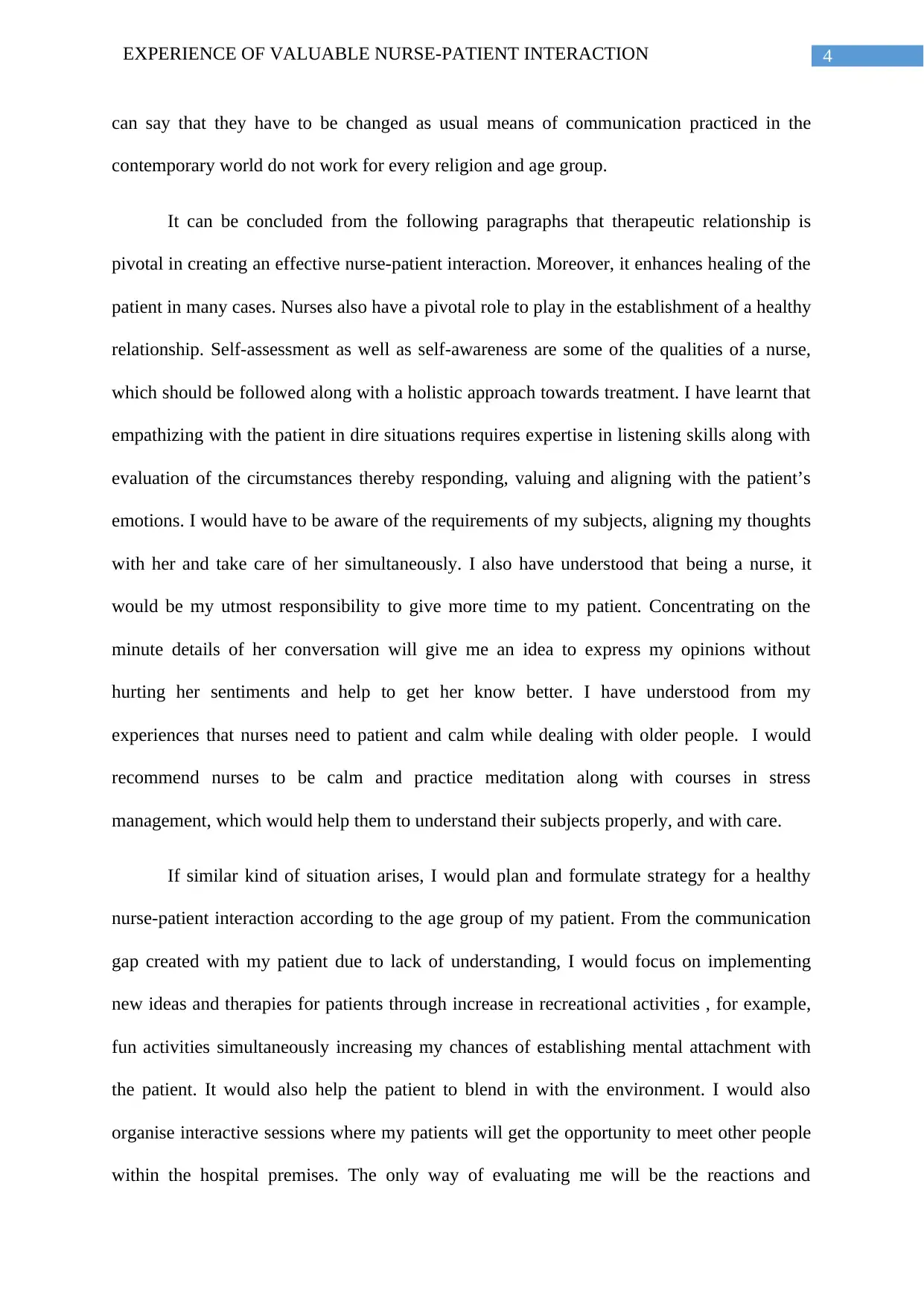
4EXPERIENCE OF VALUABLE NURSE-PATIENT INTERACTION
can say that they have to be changed as usual means of communication practiced in the
contemporary world do not work for every religion and age group.
It can be concluded from the following paragraphs that therapeutic relationship is
pivotal in creating an effective nurse-patient interaction. Moreover, it enhances healing of the
patient in many cases. Nurses also have a pivotal role to play in the establishment of a healthy
relationship. Self-assessment as well as self-awareness are some of the qualities of a nurse,
which should be followed along with a holistic approach towards treatment. I have learnt that
empathizing with the patient in dire situations requires expertise in listening skills along with
evaluation of the circumstances thereby responding, valuing and aligning with the patient’s
emotions. I would have to be aware of the requirements of my subjects, aligning my thoughts
with her and take care of her simultaneously. I also have understood that being a nurse, it
would be my utmost responsibility to give more time to my patient. Concentrating on the
minute details of her conversation will give me an idea to express my opinions without
hurting her sentiments and help to get her know better. I have understood from my
experiences that nurses need to patient and calm while dealing with older people. I would
recommend nurses to be calm and practice meditation along with courses in stress
management, which would help them to understand their subjects properly, and with care.
If similar kind of situation arises, I would plan and formulate strategy for a healthy
nurse-patient interaction according to the age group of my patient. From the communication
gap created with my patient due to lack of understanding, I would focus on implementing
new ideas and therapies for patients through increase in recreational activities , for example,
fun activities simultaneously increasing my chances of establishing mental attachment with
the patient. It would also help the patient to blend in with the environment. I would also
organise interactive sessions where my patients will get the opportunity to meet other people
within the hospital premises. The only way of evaluating me will be the reactions and
can say that they have to be changed as usual means of communication practiced in the
contemporary world do not work for every religion and age group.
It can be concluded from the following paragraphs that therapeutic relationship is
pivotal in creating an effective nurse-patient interaction. Moreover, it enhances healing of the
patient in many cases. Nurses also have a pivotal role to play in the establishment of a healthy
relationship. Self-assessment as well as self-awareness are some of the qualities of a nurse,
which should be followed along with a holistic approach towards treatment. I have learnt that
empathizing with the patient in dire situations requires expertise in listening skills along with
evaluation of the circumstances thereby responding, valuing and aligning with the patient’s
emotions. I would have to be aware of the requirements of my subjects, aligning my thoughts
with her and take care of her simultaneously. I also have understood that being a nurse, it
would be my utmost responsibility to give more time to my patient. Concentrating on the
minute details of her conversation will give me an idea to express my opinions without
hurting her sentiments and help to get her know better. I have understood from my
experiences that nurses need to patient and calm while dealing with older people. I would
recommend nurses to be calm and practice meditation along with courses in stress
management, which would help them to understand their subjects properly, and with care.
If similar kind of situation arises, I would plan and formulate strategy for a healthy
nurse-patient interaction according to the age group of my patient. From the communication
gap created with my patient due to lack of understanding, I would focus on implementing
new ideas and therapies for patients through increase in recreational activities , for example,
fun activities simultaneously increasing my chances of establishing mental attachment with
the patient. It would also help the patient to blend in with the environment. I would also
organise interactive sessions where my patients will get the opportunity to meet other people
within the hospital premises. The only way of evaluating me will be the reactions and
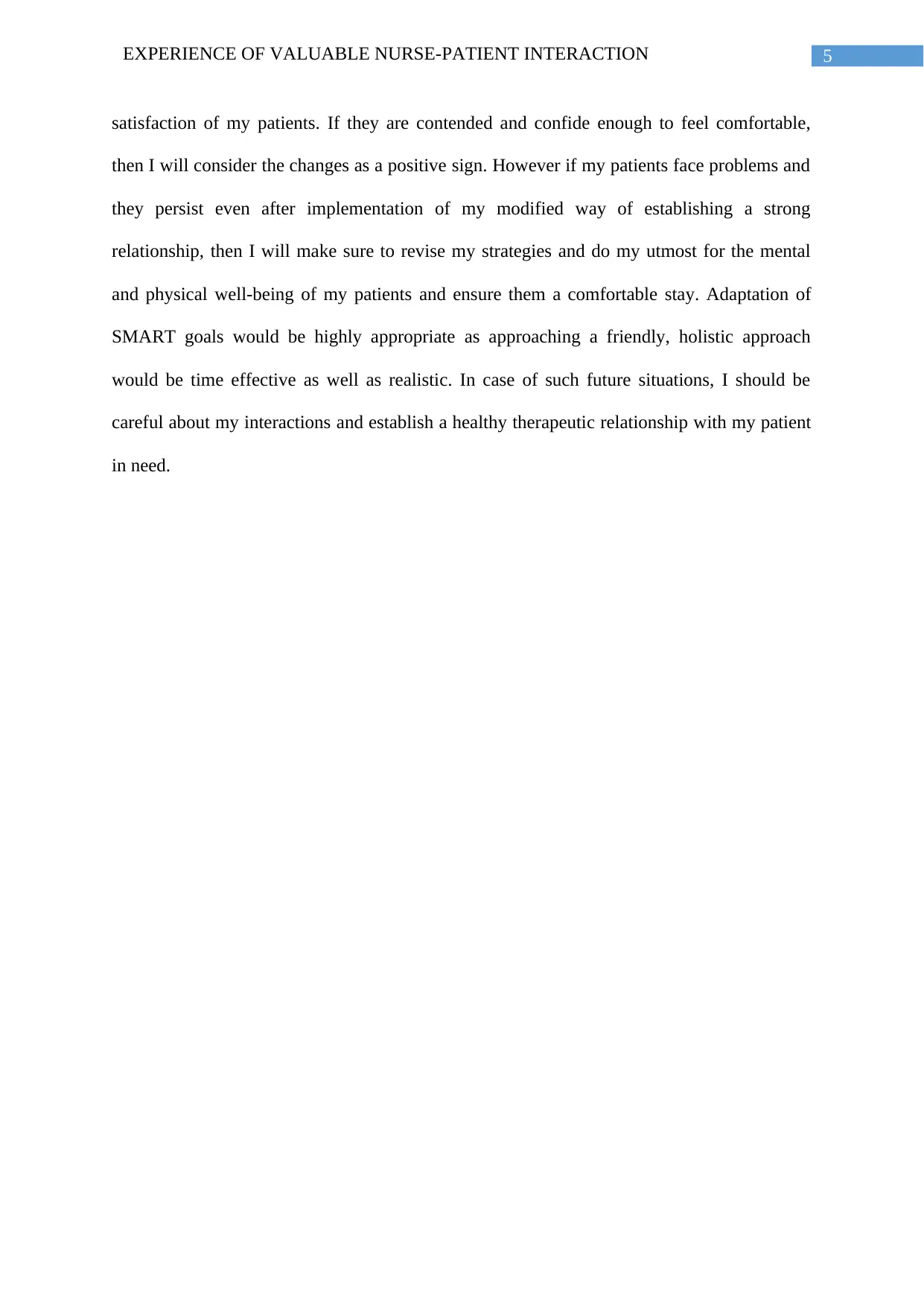
5EXPERIENCE OF VALUABLE NURSE-PATIENT INTERACTION
satisfaction of my patients. If they are contended and confide enough to feel comfortable,
then I will consider the changes as a positive sign. However if my patients face problems and
they persist even after implementation of my modified way of establishing a strong
relationship, then I will make sure to revise my strategies and do my utmost for the mental
and physical well-being of my patients and ensure them a comfortable stay. Adaptation of
SMART goals would be highly appropriate as approaching a friendly, holistic approach
would be time effective as well as realistic. In case of such future situations, I should be
careful about my interactions and establish a healthy therapeutic relationship with my patient
in need.
satisfaction of my patients. If they are contended and confide enough to feel comfortable,
then I will consider the changes as a positive sign. However if my patients face problems and
they persist even after implementation of my modified way of establishing a strong
relationship, then I will make sure to revise my strategies and do my utmost for the mental
and physical well-being of my patients and ensure them a comfortable stay. Adaptation of
SMART goals would be highly appropriate as approaching a friendly, holistic approach
would be time effective as well as realistic. In case of such future situations, I should be
careful about my interactions and establish a healthy therapeutic relationship with my patient
in need.
⊘ This is a preview!⊘
Do you want full access?
Subscribe today to unlock all pages.

Trusted by 1+ million students worldwide
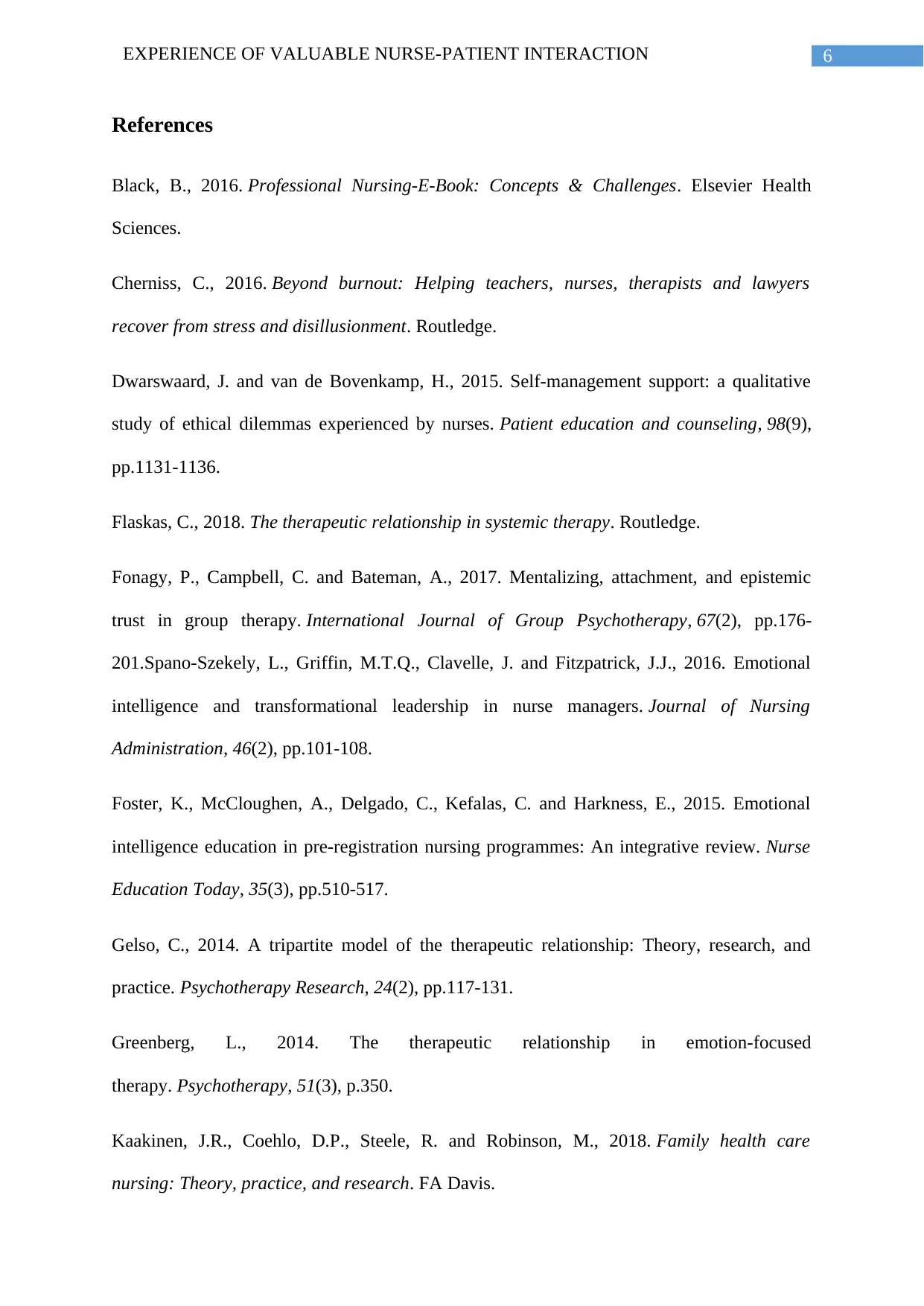
6EXPERIENCE OF VALUABLE NURSE-PATIENT INTERACTION
References
Black, B., 2016. Professional Nursing-E-Book: Concepts & Challenges. Elsevier Health
Sciences.
Cherniss, C., 2016. Beyond burnout: Helping teachers, nurses, therapists and lawyers
recover from stress and disillusionment. Routledge.
Dwarswaard, J. and van de Bovenkamp, H., 2015. Self-management support: a qualitative
study of ethical dilemmas experienced by nurses. Patient education and counseling, 98(9),
pp.1131-1136.
Flaskas, C., 2018. The therapeutic relationship in systemic therapy. Routledge.
Fonagy, P., Campbell, C. and Bateman, A., 2017. Mentalizing, attachment, and epistemic
trust in group therapy. International Journal of Group Psychotherapy, 67(2), pp.176-
201.Spano-Szekely, L., Griffin, M.T.Q., Clavelle, J. and Fitzpatrick, J.J., 2016. Emotional
intelligence and transformational leadership in nurse managers. Journal of Nursing
Administration, 46(2), pp.101-108.
Foster, K., McCloughen, A., Delgado, C., Kefalas, C. and Harkness, E., 2015. Emotional
intelligence education in pre-registration nursing programmes: An integrative review. Nurse
Education Today, 35(3), pp.510-517.
Gelso, C., 2014. A tripartite model of the therapeutic relationship: Theory, research, and
practice. Psychotherapy Research, 24(2), pp.117-131.
Greenberg, L., 2014. The therapeutic relationship in emotion-focused
therapy. Psychotherapy, 51(3), p.350.
Kaakinen, J.R., Coehlo, D.P., Steele, R. and Robinson, M., 2018. Family health care
nursing: Theory, practice, and research. FA Davis.
References
Black, B., 2016. Professional Nursing-E-Book: Concepts & Challenges. Elsevier Health
Sciences.
Cherniss, C., 2016. Beyond burnout: Helping teachers, nurses, therapists and lawyers
recover from stress and disillusionment. Routledge.
Dwarswaard, J. and van de Bovenkamp, H., 2015. Self-management support: a qualitative
study of ethical dilemmas experienced by nurses. Patient education and counseling, 98(9),
pp.1131-1136.
Flaskas, C., 2018. The therapeutic relationship in systemic therapy. Routledge.
Fonagy, P., Campbell, C. and Bateman, A., 2017. Mentalizing, attachment, and epistemic
trust in group therapy. International Journal of Group Psychotherapy, 67(2), pp.176-
201.Spano-Szekely, L., Griffin, M.T.Q., Clavelle, J. and Fitzpatrick, J.J., 2016. Emotional
intelligence and transformational leadership in nurse managers. Journal of Nursing
Administration, 46(2), pp.101-108.
Foster, K., McCloughen, A., Delgado, C., Kefalas, C. and Harkness, E., 2015. Emotional
intelligence education in pre-registration nursing programmes: An integrative review. Nurse
Education Today, 35(3), pp.510-517.
Gelso, C., 2014. A tripartite model of the therapeutic relationship: Theory, research, and
practice. Psychotherapy Research, 24(2), pp.117-131.
Greenberg, L., 2014. The therapeutic relationship in emotion-focused
therapy. Psychotherapy, 51(3), p.350.
Kaakinen, J.R., Coehlo, D.P., Steele, R. and Robinson, M., 2018. Family health care
nursing: Theory, practice, and research. FA Davis.
Paraphrase This Document
Need a fresh take? Get an instant paraphrase of this document with our AI Paraphraser
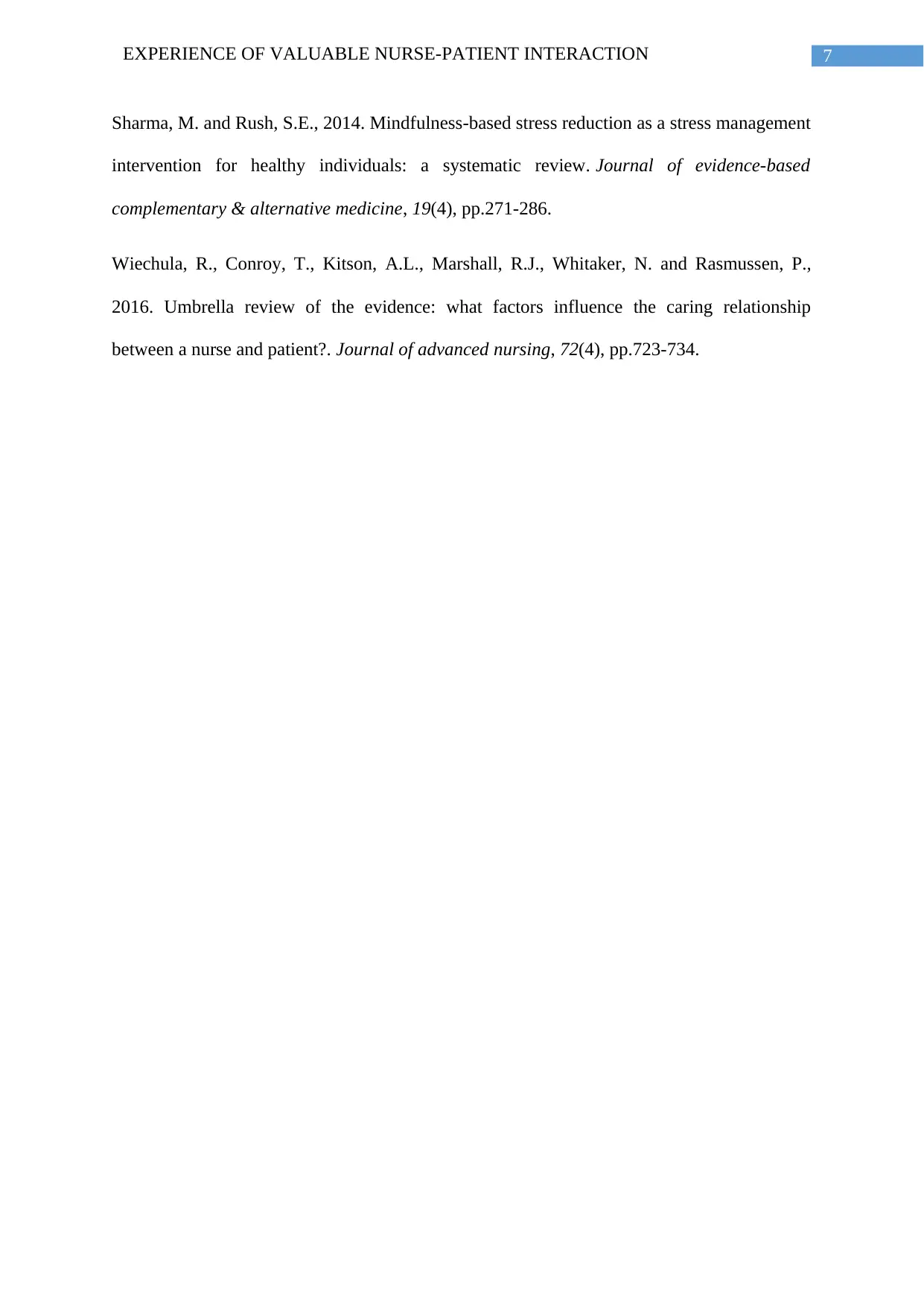
7EXPERIENCE OF VALUABLE NURSE-PATIENT INTERACTION
Sharma, M. and Rush, S.E., 2014. Mindfulness-based stress reduction as a stress management
intervention for healthy individuals: a systematic review. Journal of evidence-based
complementary & alternative medicine, 19(4), pp.271-286.
Wiechula, R., Conroy, T., Kitson, A.L., Marshall, R.J., Whitaker, N. and Rasmussen, P.,
2016. Umbrella review of the evidence: what factors influence the caring relationship
between a nurse and patient?. Journal of advanced nursing, 72(4), pp.723-734.
Sharma, M. and Rush, S.E., 2014. Mindfulness-based stress reduction as a stress management
intervention for healthy individuals: a systematic review. Journal of evidence-based
complementary & alternative medicine, 19(4), pp.271-286.
Wiechula, R., Conroy, T., Kitson, A.L., Marshall, R.J., Whitaker, N. and Rasmussen, P.,
2016. Umbrella review of the evidence: what factors influence the caring relationship
between a nurse and patient?. Journal of advanced nursing, 72(4), pp.723-734.
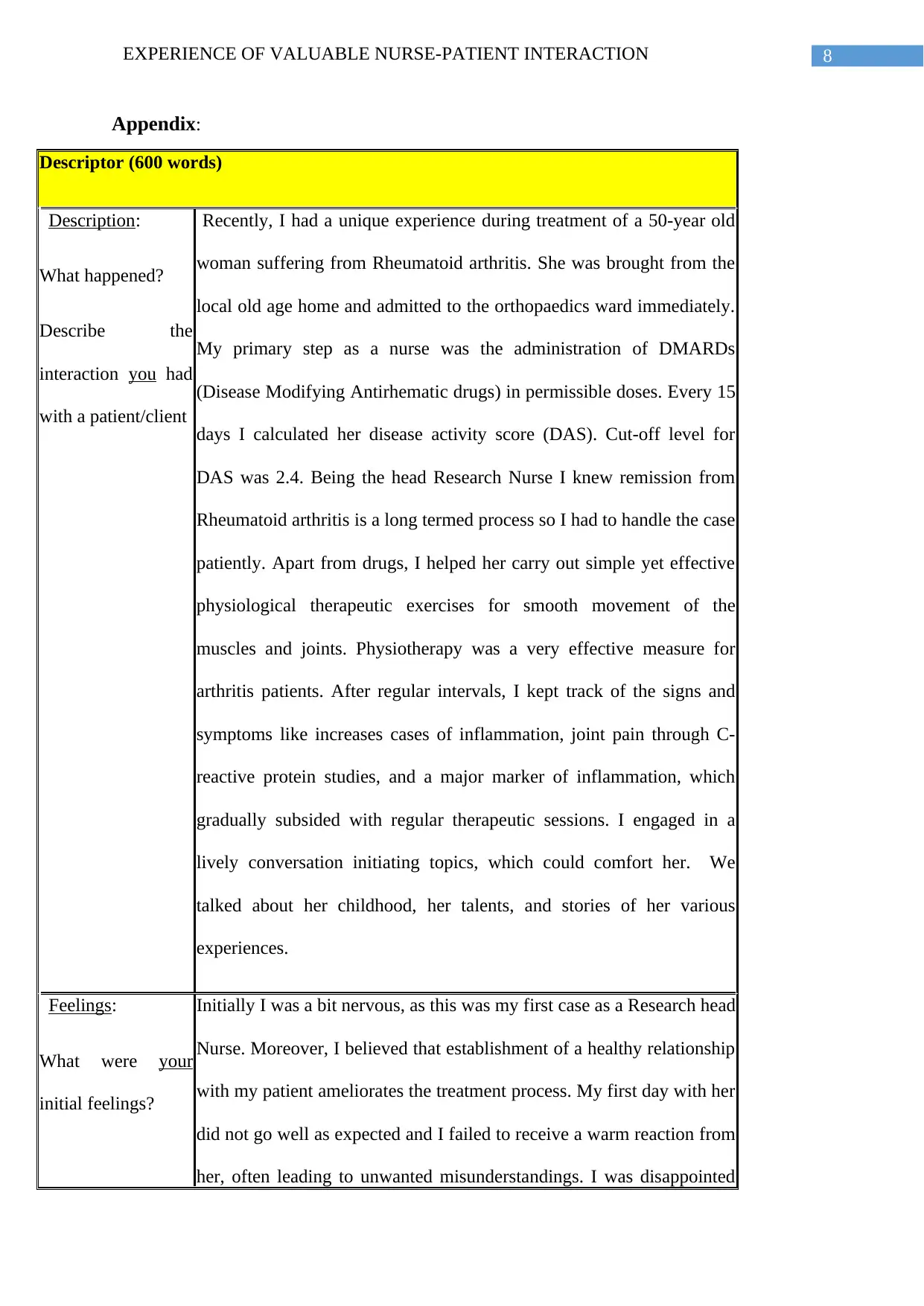
8EXPERIENCE OF VALUABLE NURSE-PATIENT INTERACTION
Appendix:
Descriptor (600 words)
Description:
What happened?
Describe the
interaction you had
with a patient/client
Recently, I had a unique experience during treatment of a 50-year old
woman suffering from Rheumatoid arthritis. She was brought from the
local old age home and admitted to the orthopaedics ward immediately.
My primary step as a nurse was the administration of DMARDs
(Disease Modifying Antirhematic drugs) in permissible doses. Every 15
days I calculated her disease activity score (DAS). Cut-off level for
DAS was 2.4. Being the head Research Nurse I knew remission from
Rheumatoid arthritis is a long termed process so I had to handle the case
patiently. Apart from drugs, I helped her carry out simple yet effective
physiological therapeutic exercises for smooth movement of the
muscles and joints. Physiotherapy was a very effective measure for
arthritis patients. After regular intervals, I kept track of the signs and
symptoms like increases cases of inflammation, joint pain through C-
reactive protein studies, and a major marker of inflammation, which
gradually subsided with regular therapeutic sessions. I engaged in a
lively conversation initiating topics, which could comfort her. We
talked about her childhood, her talents, and stories of her various
experiences.
Feelings:
What were your
initial feelings?
Initially I was a bit nervous, as this was my first case as a Research head
Nurse. Moreover, I believed that establishment of a healthy relationship
with my patient ameliorates the treatment process. My first day with her
did not go well as expected and I failed to receive a warm reaction from
her, often leading to unwanted misunderstandings. I was disappointed
Appendix:
Descriptor (600 words)
Description:
What happened?
Describe the
interaction you had
with a patient/client
Recently, I had a unique experience during treatment of a 50-year old
woman suffering from Rheumatoid arthritis. She was brought from the
local old age home and admitted to the orthopaedics ward immediately.
My primary step as a nurse was the administration of DMARDs
(Disease Modifying Antirhematic drugs) in permissible doses. Every 15
days I calculated her disease activity score (DAS). Cut-off level for
DAS was 2.4. Being the head Research Nurse I knew remission from
Rheumatoid arthritis is a long termed process so I had to handle the case
patiently. Apart from drugs, I helped her carry out simple yet effective
physiological therapeutic exercises for smooth movement of the
muscles and joints. Physiotherapy was a very effective measure for
arthritis patients. After regular intervals, I kept track of the signs and
symptoms like increases cases of inflammation, joint pain through C-
reactive protein studies, and a major marker of inflammation, which
gradually subsided with regular therapeutic sessions. I engaged in a
lively conversation initiating topics, which could comfort her. We
talked about her childhood, her talents, and stories of her various
experiences.
Feelings:
What were your
initial feelings?
Initially I was a bit nervous, as this was my first case as a Research head
Nurse. Moreover, I believed that establishment of a healthy relationship
with my patient ameliorates the treatment process. My first day with her
did not go well as expected and I failed to receive a warm reaction from
her, often leading to unwanted misunderstandings. I was disappointed
⊘ This is a preview!⊘
Do you want full access?
Subscribe today to unlock all pages.

Trusted by 1+ million students worldwide
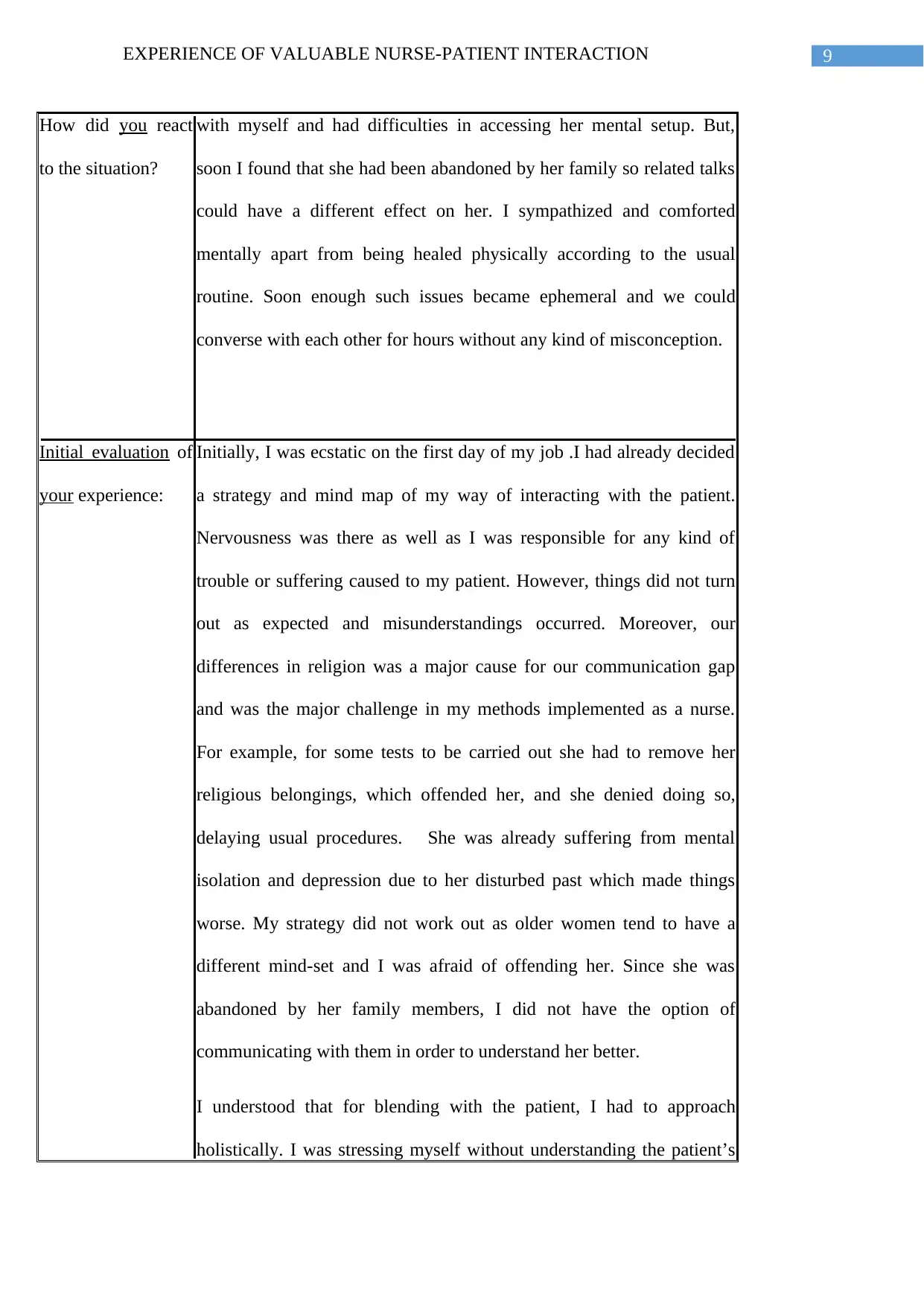
9EXPERIENCE OF VALUABLE NURSE-PATIENT INTERACTION
How did you react
to the situation?
with myself and had difficulties in accessing her mental setup. But,
soon I found that she had been abandoned by her family so related talks
could have a different effect on her. I sympathized and comforted
mentally apart from being healed physically according to the usual
routine. Soon enough such issues became ephemeral and we could
converse with each other for hours without any kind of misconception.
Initial evaluation of
your experience:
Initially, I was ecstatic on the first day of my job .I had already decided
a strategy and mind map of my way of interacting with the patient.
Nervousness was there as well as I was responsible for any kind of
trouble or suffering caused to my patient. However, things did not turn
out as expected and misunderstandings occurred. Moreover, our
differences in religion was a major cause for our communication gap
and was the major challenge in my methods implemented as a nurse.
For example, for some tests to be carried out she had to remove her
religious belongings, which offended her, and she denied doing so,
delaying usual procedures. She was already suffering from mental
isolation and depression due to her disturbed past which made things
worse. My strategy did not work out as older women tend to have a
different mind-set and I was afraid of offending her. Since she was
abandoned by her family members, I did not have the option of
communicating with them in order to understand her better.
I understood that for blending with the patient, I had to approach
holistically. I was stressing myself without understanding the patient’s
How did you react
to the situation?
with myself and had difficulties in accessing her mental setup. But,
soon I found that she had been abandoned by her family so related talks
could have a different effect on her. I sympathized and comforted
mentally apart from being healed physically according to the usual
routine. Soon enough such issues became ephemeral and we could
converse with each other for hours without any kind of misconception.
Initial evaluation of
your experience:
Initially, I was ecstatic on the first day of my job .I had already decided
a strategy and mind map of my way of interacting with the patient.
Nervousness was there as well as I was responsible for any kind of
trouble or suffering caused to my patient. However, things did not turn
out as expected and misunderstandings occurred. Moreover, our
differences in religion was a major cause for our communication gap
and was the major challenge in my methods implemented as a nurse.
For example, for some tests to be carried out she had to remove her
religious belongings, which offended her, and she denied doing so,
delaying usual procedures. She was already suffering from mental
isolation and depression due to her disturbed past which made things
worse. My strategy did not work out as older women tend to have a
different mind-set and I was afraid of offending her. Since she was
abandoned by her family members, I did not have the option of
communicating with them in order to understand her better.
I understood that for blending with the patient, I had to approach
holistically. I was stressing myself without understanding the patient’s
Paraphrase This Document
Need a fresh take? Get an instant paraphrase of this document with our AI Paraphraser
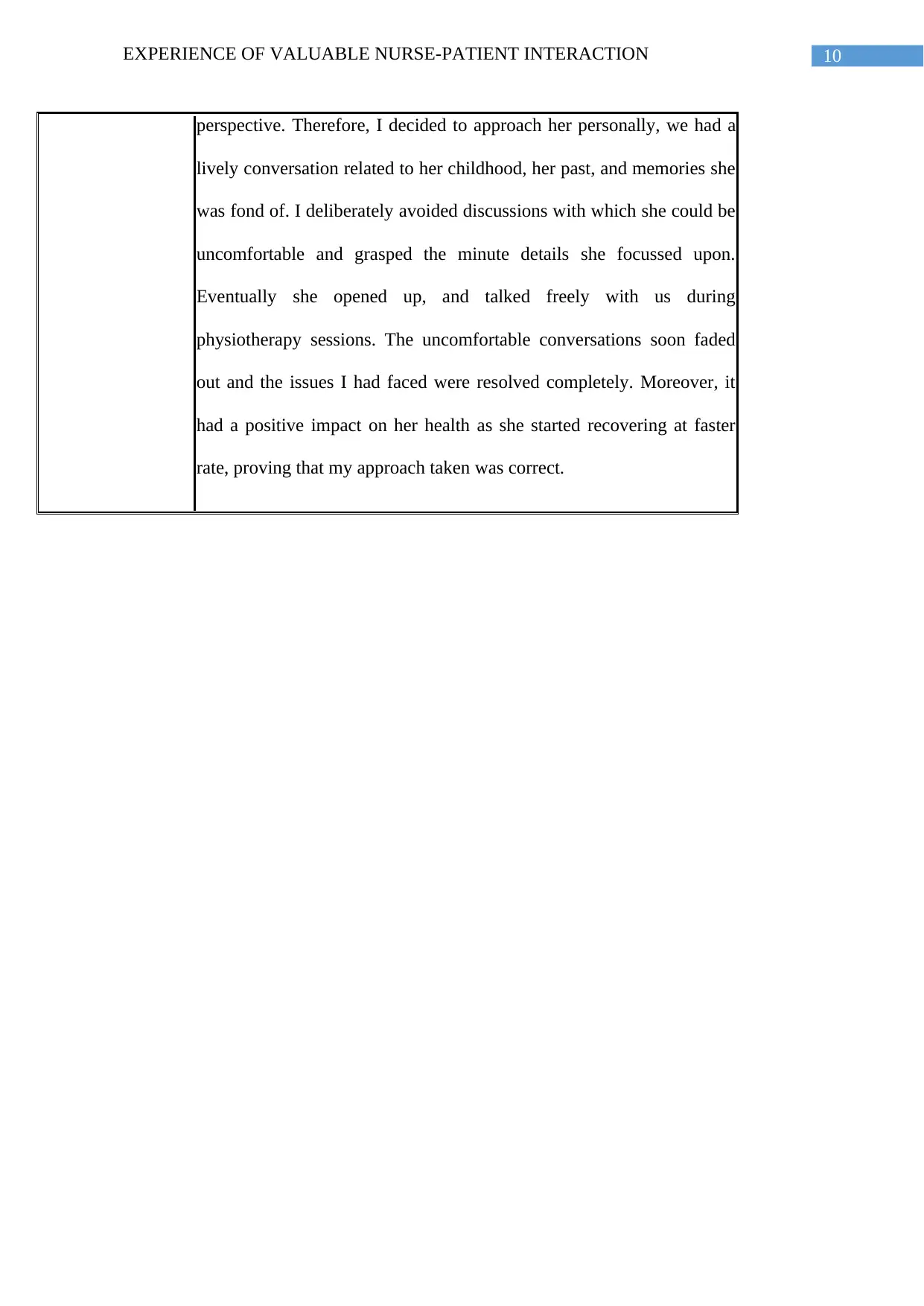
10EXPERIENCE OF VALUABLE NURSE-PATIENT INTERACTION
perspective. Therefore, I decided to approach her personally, we had a
lively conversation related to her childhood, her past, and memories she
was fond of. I deliberately avoided discussions with which she could be
uncomfortable and grasped the minute details she focussed upon.
Eventually she opened up, and talked freely with us during
physiotherapy sessions. The uncomfortable conversations soon faded
out and the issues I had faced were resolved completely. Moreover, it
had a positive impact on her health as she started recovering at faster
rate, proving that my approach taken was correct.
perspective. Therefore, I decided to approach her personally, we had a
lively conversation related to her childhood, her past, and memories she
was fond of. I deliberately avoided discussions with which she could be
uncomfortable and grasped the minute details she focussed upon.
Eventually she opened up, and talked freely with us during
physiotherapy sessions. The uncomfortable conversations soon faded
out and the issues I had faced were resolved completely. Moreover, it
had a positive impact on her health as she started recovering at faster
rate, proving that my approach taken was correct.
1 out of 11
Related Documents
Your All-in-One AI-Powered Toolkit for Academic Success.
+13062052269
info@desklib.com
Available 24*7 on WhatsApp / Email
![[object Object]](/_next/static/media/star-bottom.7253800d.svg)
Unlock your academic potential
Copyright © 2020–2026 A2Z Services. All Rights Reserved. Developed and managed by ZUCOL.





